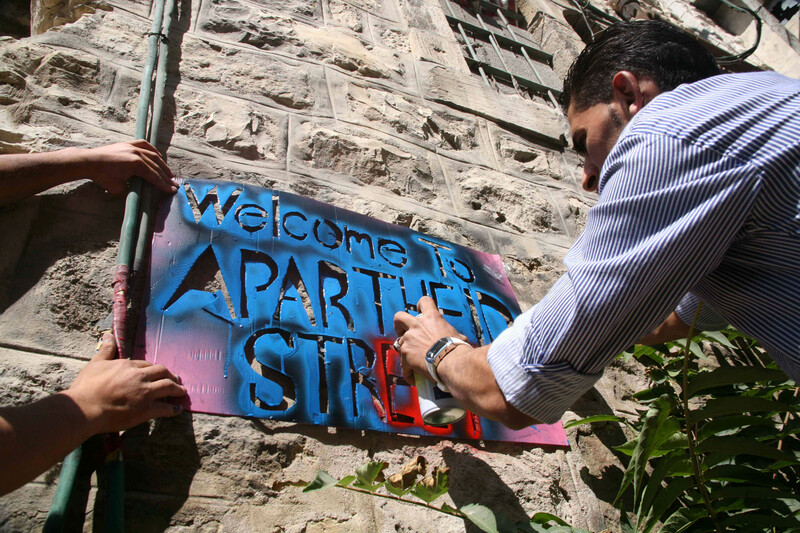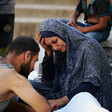Activism and BDS Beat 26 February 2014

It has become quite difficult not to declare Israel an apartheid state.
APA imagesThe following statement is by the Harvard Palestine Solidarity Committee:
On Monday, the Harvard Palestine Solidarity Committee (PSC) launched a testimony campaign, similar to last year’s mock eviction notices, to kick off international Israeli Apartheid Week (IAW).
The notices, posted on Harvard undergraduate student dorm-room doors, ask the questions, “How have you experienced apartheid?” or “What does apartheid mean to you?”
A variety of Harvard community members, from graduate and undergraduate students to service workers, have answered these questions from their own experiences, positionalities/identities and claims on subjective apartheid.
Harvard community members who identify as African-American/Black, Latin@, LGBTQ, Muslim, Jewish, working class, gender minority, disabled and of course Palestinian students, have been asked to grapple with a problem that exists not only in the supposed Holy Land or Africa, but also right here at home.
Apartheids produce actual lived experiences; yet, when intellectuals debate, academics analyze and critique, and governmental officials compartmentalize the term “apartheid,” it becomes an object to be studied, and not a force that lives, or rather, imposes itself on lives.
As Subcomandante Marcos of the Zapatista movement in Chiapas, Mexico would say, “We seek a world where there is room for many worlds.” We are interested in flipping the question, or rather, flipping the question inside out to hear how apartheid relates to the lived experiences of Harvard community members.
Our campaign is about genuinely asking and compassionately listening to personal narratives related to apartheid, and whatever that concept of apartheid may mean to people; be it discrimination, alienation, dehumanization, racism, marginalization or segregation, amongst others.
An apartheid state
A simple Google search confirms that situations as diverse as the United States to Rhodesia, the north of Ireland to Brazil, Latin America to Saudi Arabia all have the word apartheid attached to them in ways old and new.
It was called apartheid in South Africa, segregation in the United States, and has become hafrada in Israel, a Hebrew word defining the official Israeli state policy of “separateness” imposed on Palestinians.
From segregated roads, buses, and territories, to checkpoints, a massive separation barrier and the largest open-air prison in the world in Gaza, it has become quite difficult not to declare Israel an apartheid state.
In following the example of the Truth and Reconciliation Commission, which sought to hear the real lived stories of those who suffered under South African apartheid, PSC has compiled a list of testimonies to a blog where they can be accessed by all to bear witness, jointly heal, and take part in the process of standing against apartheids that perpetuate in our societies.
We are additionally planning an open-mic night in which these testimonies will be made public so that they are not only written and read, but heard.
As Audre Lorde famously stated, “There is no thing as a single issue struggle, because we do not live single issue lives.” The focus on building solidarity through recognizing our intersectionalities on experiences of apartheid is important.
As one testimony notes, “I grew up hearing often about the horror that the Holocaust inflicted on people like me. Under the Third Reich, Jews were disenfranchised, subjected to discriminatory laws and ultimately forced to leave their homes, often for concentration camps … I hope never to forget the cruelty of state-sanctioned discrimination — and the stories of the brave and resilient people who organize against unjust systems of segregation and apartheid.”
Remixing stories
Another strength of these testimonies is that they shed light on the often-overlooked cracks in Harvard’s history. “Annenberg [dining hall] was open for the summer, and a white woman comes in, hangs her purse, and thought it [the purse] was opened. The manager calls out and lined up the seven black men from the kitchen, and used the n-word. He said whichever black person … did it would have to apologize that they did it, and be disciplined.”
Recognizing historical shame is necessary for groups to work through, heal and overcome histories of apartheids, while laying the groundwork for more inclusive social realities.
The remix of stories from Palestinian students who have lived under Israeli apartheid to students of color who talk about the pre-sanctioned closets of queerness allows us to recognize both the inward and outward effects of apartheid.
A Palestinian student from Gaza writes, “I go to the bathroom to get ready for school, but there is no water to wash my face with. A few airstrikes in the morning are common;” while a queer student of color speaks about struggling to find a safe space for himself in the world: “My only option became suffering in isolating silence and living in pretense, sacrificing my life for mere survival in my private and public apartheid.”
For those who believe that our campaign makes “complex” issues too “simple,” let us visit a quote from one of the testimonies: “From Harvard to Palestine, my apartheid exists because people don’t want me to exist.”
The issue becomes quite clear when you actually listen to people. The need to build parallels with humans who experience apartheid in various places across the globe is real.
Existence becomes resistance for black and brown bodies pipelined into the prison systems under American apartheid, just as it does when Palestinian children are taken hostage and imprisoned in the middle of the night in apartheid Israel.
And for those who argue, doubt or spend too much energy on the supposed “facts,” let us not forget that it is our sacred stories that rehumanize and cause people to feel again that raw emotion. Then, they are ready to mobilize towards positive social change.
Decolonizing
As humans dedicated to social justice, the testimonies are furthermore crucial to the process of decolonzing our minds. Whether calling for divestment at campuses across the country or building new narratives to reshape the hearts and minds of marginalized communities, this campaign teaches us that activists and organizers can’t just treat Palestine or our allies like objects.
There is an inner-outer exchange to the processes we undertake, a liminal space where we encounter each other in oneness through joint struggle — which has important implications.
A Harvard student who is the child of undocumented immigrants notes, “All I ask is for a chance to live without the need to prove to people that they owe me my humanity.”
As many learned at this year’s National Students for Justice in Palestine conference at Stanford, the struggle is not sexy, and it takes a lot of hard work and time. We must be rigorous in building better relationships with our allies, each other and — equally important — with our own selves, stories being the basis for our personal and social inner/outer praxis in the long-term struggle towards love, justice and peace.
As our stories connect the dots scattered by apartheids, like Palestinians from their lands, our active participation in joint struggle, working with, for, and in solidarity with our allies at Harvard, is a conscious decision to build community at Harvard and elsewhere on more equal and just terms.
It is our conviction that by participating in the process of our testimony campaign, we can reach for those stories that will challenge and redefine not only what apartheid means, but the collection of narratives that currently segregates Harvard.






Comments
I think the term becomes too
Permalink Wieland Hoban replied on
I think the term becomes too vague when applied as variously as it is here. There's a difference between social discrimination, sometimes subtle and sometimes explicit, and actual state regulations. I don't think it's helpful for the word to lose its precise meaning.
Any input from South African citizens who were there?
Permalink Richard Shute replied on
From the country that coined the phrase
I thought not. This is a gratuitous, presumptive arrogant exercise.
Deplorable.
Harvard project
Permalink duane anderson replied on
I glad to read that Harvard student are attempting to document and circulate their
findings.
It seems that those discuss the conditions in palistine are ruthlessly smeared and attacked by the zionist In America for being antisemetic.
I am intimidated by the zionist movement in America.
I differentiate zionism from the Jewish people, customs and religious practices as they are not the same. I believe that what is unfolding is systematic genocide
of the Palistinian people much the same as invaders from europe commited
genocide on the native peoples of north and south america.
Nora you greatly missed in your absence from KPFA. The airwaves seem to
be lacking since your departure.
I apologize for the spelling errors, and have no spell check on my nook. I am very dyslexic.When I think about what is happening to the palistian people I see
Holocaust.